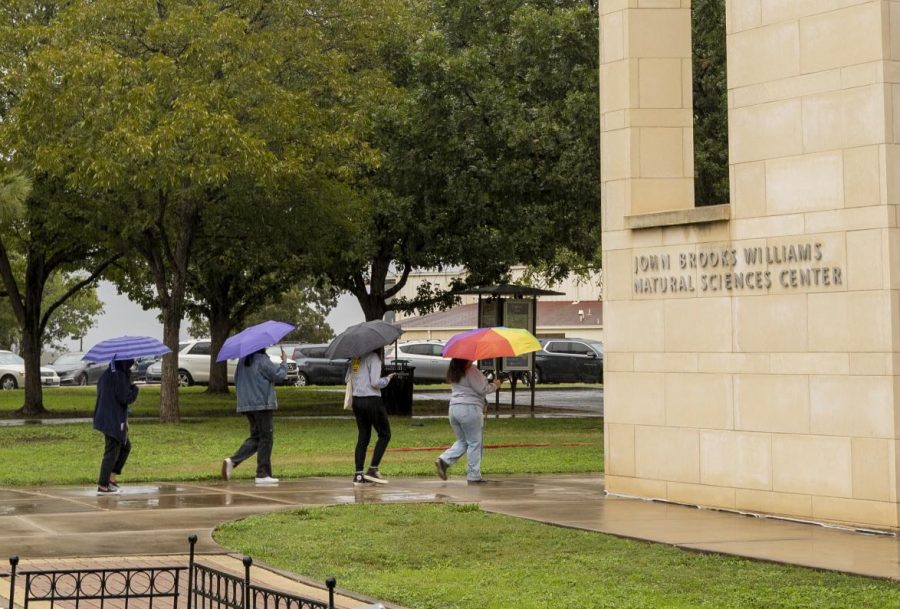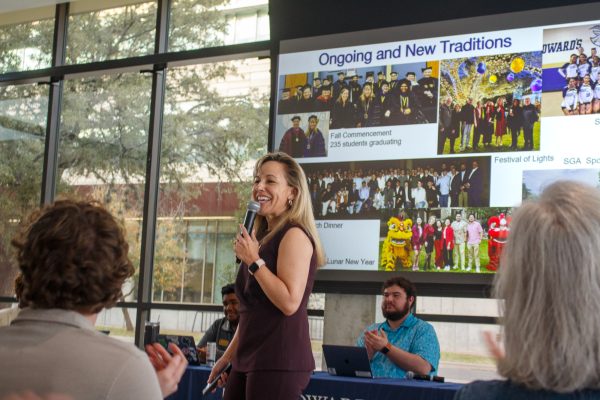St. Edward’s becomes a destination university for environmental programs
The John Brooks Williams Natural Science center his home to almost every environmental major and minor, other than Environmental Humanities, which belongs to the the School of Arts and Humanities.
St. Edward’s University offers three Bachelor of Science degrees surrounding environmentalism: Environmental Chemistry, Environmental Science and Policy and Environmental Biology and Climate Change. A minor in Environmental Humanities and a certificate in Environmental Management are also being offered for the first time this year.
Environmental Chemistry and Environmental Biology and Climate Change are offered as majors and minors. Both of these are housed in the School of Natural Sciences.
Environmental Chemistry was first introduced as a major in 2006. According to chemistry lab manager Lissette Curry, students in this program come to understand the various ways that chemical effects and reactions impact different systems through chemical mitigation and remediation strategies, green chemical synthesis, emerging contaminant detection methods or other techniques.
“It’s this understanding that serves as the foundation for the development of sound policies, effective remediation efforts and robust sustainability practices,” Curry said.
Environmental Biology and Climate Change was added as a major last fall in 2021. This semester, EBCC is also being offered as a minor. According to associate professor for the biological sciences and program director Kim O’Keefe, this program emphasizes ecological science through the large-scale lens of climate change and course-based undergraduate research experience.
“Any job that a student is trying to get after completing this degree is likely to have some relationship with climate change,” O’Keefe said. “It’s affecting everything that we’re doing with the environment.”
Students with either of these majors will graduate with a Bachelor of Science degree. While they both examine the science behind the changes in the environment, the key difference between the majors is the field they emphasize: biology or chemistry. Regardless, both academic pathways require an internship in an environmental-focused laboratory and research conducted with a faculty member.
Outside of the School for Natural Sciences, St. Edward’s has another Bachelor of Science with an environmental focus. First implemented in 2005, the School of Behavioral and Social Sciences offers Environmental Science and Policy as an interdisciplinary major and minor program geared towards sustainability.
“The idea is that you need (multiple fields of study) to understand environmental issues because they’re so interrelated,” Peter Beck, professor and coordinator of Environmental Science and Policy, said. “You need to be looking at all these different connections.”
Research is an integral part of all of these majors. Students from the EBCC and Environmental Science and Policy programs conduct research at Wild Basin and various urban and rural sites in the Austin area; the Environmental Chemistry students participate in research with a mentor.
Students can also obtain a minor in Environmental Humanities from the School for Arts and Humanities. Professor and coordinator for the Environmental Humanities minor, Sasha West, explained that this program uses arts, ethics and action to view and communicate the environmental changes impacting the world.
“We need ways to make human meaning out of the grief we feel over losses and storms,” West said. “We need ways to celebrate the hopeful developments and imagine a more sustainable, equitable future.”
Offered for the first time this year, the university has added a certificate in Environmental Management to its repertoire. It is currently embedded in the Environmental Science and Policy program, meaning that only students already studying Environmental Science and Policy are able to receive the certificate at this time. Associate professor of Environmental Science and Policy, Amy Concilio, hopes this will change the longer the certificate is offered.
“The things (students) learn in this program are basically all of the skills that you need to work in the natural resources and conservation world,” Concilio said.
According to Beck, another certificate involving sustainability is expected to be offered at the university in addition to the Environmental Management certificate.
With all of the environmental programs available at the university, a new interdisciplinary group of faculty, staff and students has been created this semester as part of Strategic Plan 2027 to facilitate better collaboration and communication between these environmentally and sustainably focused programs.
“All the activities and programs that were historically somewhat siloed are coming together,” Concilio said.

Melissa Gunning is graduating this December with a degree in psychology, minor in writing and rhetoric and certificate in evidence-based addiction counseling....










